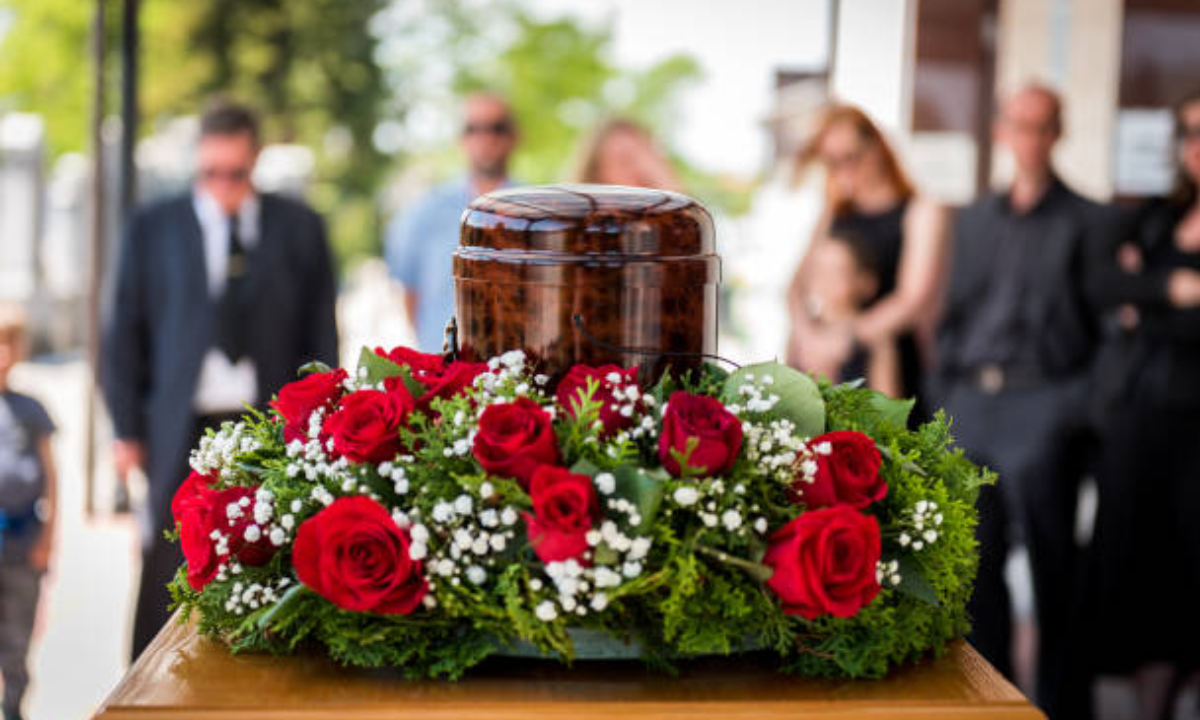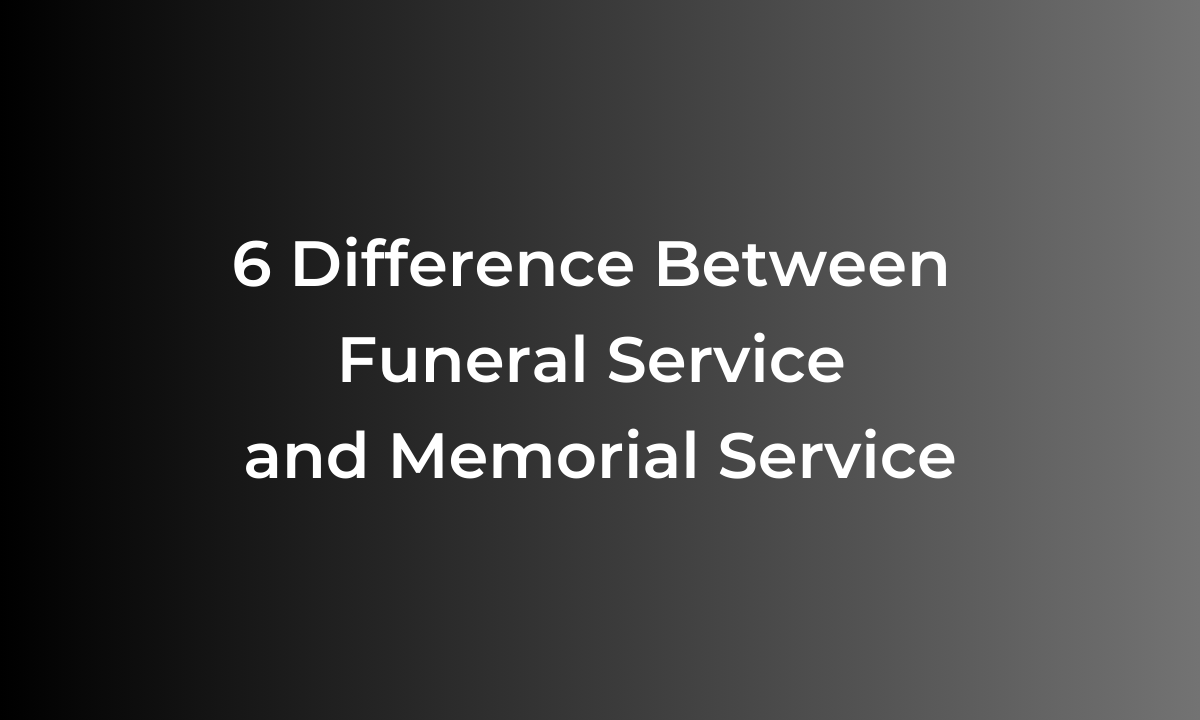Funeral services and memorial ceremonies are two traditional methods to celebrate and remember the deceased. When a loved one dies, determining how to remember their memory is an extremely personal decision. Each with its own set of advantages and customs. Funerals, which are sometimes marked by formal ceremonies and specialized rites, are usually held quickly after the death and involve intimate family and friends gathering to mourn and pay their respects. Memorial services, on the other hand, offer greater flexibility in terms of schedule and venue, allowing families to assemble at a later period to celebrate the deceased’s life and achievements rather than the process of mourning itself.
Understanding the differences between a traditional funeral and a memorial ceremony will help you plan a fitting tribute in India, where funeral traditions are influenced by a variety of cultures and customs. Understanding the differences between a typical funeral and a more individualized memorial ceremony will allow you to make the best decision for honoring your loved one’s memory while respecting cultural and personal preferences.
Understanding the Purpose of Funerals

A funeral is a formal event held shortly after a person’s death to honor and remember their life. This significant event brings family and friends together, providing mutual support and an opportunity to grieve together. Funerals may incorporate religious or cultural rites that represent the deceased’s and their family’s beliefs and traditions. In addition to the ceremonial aspects, funerals may include a viewing or wake when attendees can pay their respects and say their final goodbyes in a courteous and dignified manner.
In Bangalore, where a complex tapestry of cultural and religious traditions impacts funeral practices, recognizing the aim of a funeral is critical to leaving a lasting legacy. Whether you are planning traditional funeral services in Bangalore or looking for unique traditions that reflect your personal or cultural preferences, this ceremony is critical for bringing closure and honoring a loved one’s memory.
Understanding the importance of a memorial service.
Unlike a traditional funeral, a memorial ceremony is performed after the body has been buried or cremated to honor the deceased and highlight their life and legacy. This type of service allows families to honor their loved one in a more flexible and personal manner, as it may be scheduled at a time that is convenient for everyone concerned. Memorial services, unlike traditional funerals, are less structured, allowing attendees to reflect on the deceased’s accomplishments and character.
Memorial services offer an opportunity to include personal touches that showcase the deceased’s distinct personality and hobbies. This could include passionate speeches, favorite music, or multimedia presentations that document particular moments and memories. Because of the flexibility in date and venue, families in Bangalore and elsewhere can design a service that genuinely honors their loved ones, providing an opportunity to celebrate their life in a way that is personal and suitable.
Key Differences Between a Funeral and a Memorial Service
When deciding between a funeral and a memorial service, it is vital to understand the fundamental distinctions, which revolve around time, location, and focus.
Funerals are usually held soon following a person’s death, sometimes within a few days. This brief timeframe allows relatives and friends to quickly gather to pay their respects and offer assistance. In contrast, memorial services provide for greater scheduling flexibility. They can occur weeks or even months after the death, giving you more time to plan and organize. This flexibility could be especially useful for folks who need to travel or make complex plans.
Funerals are typically held at a funeral home, church, or other formal venue. These facilities offer a structured environment for services and frequently accommodate old ceremonies and rituals. However, memorial services offer more freedom in terms of location. They can take place in a number of settings with personal significance, such as a family home, park, or other memorable sites, resulting in a more personalized and relaxing environment.
Funerals are primarily concerned with the formal grieving process, which may involve religious or cultural ceremonies, as well as a viewing or open casket. Memorial services, on the other hand, are intended to celebrate the deceased’s life and accomplishments. They are typically less formal and may include personal touches such as speeches, music, and multimedia tributes that represent the deceased’s distinct personality and hobbies.
Traditional Funeral Customs and Rituals
Traditional funerals are rich in customs and rituals that reflect the deceased’s cultural and religious beliefs, as well as those of the greater society. These time-honored traditions provide structure and purpose to the process of saying farewell, allowing those who remain behind to find solace and closure.
A viewing, also known as a wake, is an opportunity for relatives and friends to pay their respects to the deceased and offer their condolences to the mourning family. This hour allows loved ones to pay their respects, exchange memories, and begin the grieving process in a friendly environment.
The funeral service is a ceremonial rite that is often steeped in tradition. It may include prayers, music, eulogies, and readings reflecting the deceased’s beliefs and morals. This meeting allows people who knew the deceased to participate in a communal act of mourning, offering mutual support and sharing in their grief.
Following the funeral service, there is typically a procession to the cemetery or burial site. This somber trek with mourners after the funeral is a symbolic farewell that signifies the passage from life to death.
The final step of Burial or Cremation, in traditional funerals is to bury or cremate the body. Whether the body is put in a cemetery or cremated, this act provides a physical finality to the grief process while honoring the deceased in a respectful and meaningful way.
Unique Elements of a Memorial Service
Memorial services offer a rare opportunity to pay a highly personal and meaningful homage to the deceased. Unlike traditional funerals, memorial ceremonies can be tailored to the person being honored with unique features, allowing for a meaningful celebration of their life and the memories they leave behind.
Personal tributes are an important part of any memorial service. These may take the form of eulogies, speeches, or stories given by friends and family. These sincere words honor the deceased’s life, accomplishments, and impact on others, turning the funeral into a celebration of their journey.
Multimedia displays, such as slideshows or films, are frequently used at memorial ceremonies. These graphic components can highlight important moments and memories, bringing the deceased’s life to life in an entertaining and emotional way. These presentations are a great way to remember and celebrate a person’s legacy.
Another distinctive characteristic of a memorial ceremony is the use of themed decorations. Items and decorations representing the deceased’s hobbies, passions, or favorite colors can be used to customize the area, resulting in a setting that genuinely expresses their personality and character.
Memorial services may sometimes include special rites or ceremonies of personal importance. These personalized rituals can be tailored to honor the deceased in ways that are meaningful to both them and their loved ones, bringing the funeral to a genuinely personal level.
How to Plan a Meaningful Funeral or Memorial Service
To plan a meaningful funeral or memorial ceremony, consider the deceased’s intentions, if known, as well as the family’s preferences. This procedure guarantees that the service not only respects the person’s life but also brings comfort to those who attend. Here are some tips to help you create a genuine and appropriate tribute.
Discuss Preferences: Start by talking with family members and close friends to get their ideas and any specific wishes the deceased may have had. Understanding their wishes can help to ensure that the service fits both the deceased’s and the family’s needs.
Select a Type of Service: Decide whether a regular funeral or a memorial service is the best option. Consider the timing, location, and intended atmosphere. A funeral may be better suited to a formal, immediate celebration, but a memorial service is more adaptable and can focus on celebrating the person’s life.
Choose the major elements: Plan the service’s main components, including music, readings, and tributes. These should reflect the deceased’s personality, passions, and life narrative. Personalizing these features ensures that the service is meaningful and relevant to all participants.
Coordinate logistics, which includes arranging transportation, identifying a venue, and completing any necessary permits or paperwork. Keeping these elements organized enhances service efficiency while minimizing stress for the family.
Personalize the Service: Finally, add personal touches to honor the deceased’s life. This could include showing images, playing their favorite music, or asking them to share their memories. These personal components help to create a service that honors the deceased while also soothing those who loved them.
Conclusion
The choice between a funeral and a memorial service is highly personal, influenced by several factors such as date, location, and ceremonial tone. Both options are meaningful ways to honor and remember a loved one, and each offers a distinct space for reflection, support, and celebration. While a traditional funeral provides a more immediate and structured environment, a memorial service allows for greater flexibility and the creation of a more personalized legacy.
Understanding cultural and religious distinctions is critical in India, where end-of-life ceremonies are heavily influenced by tradition. Whether you choose a traditional funeral or a memorial service, the purpose is the same: to create a meaningful tribute that honors the deceased while also providing comfort and closure to those in attendance. By carefully considering the wishes of the departed and their family, you can design a ceremony that speaks to those who assemble to commemorate and celebrate a life well spent, ensuring that the funeral services in India are both respectful and emotional.
Beleiv assists dispossessed families with different administrations connected with incineration, like Funeral Services, documentation, and other necessities. Contact us today




